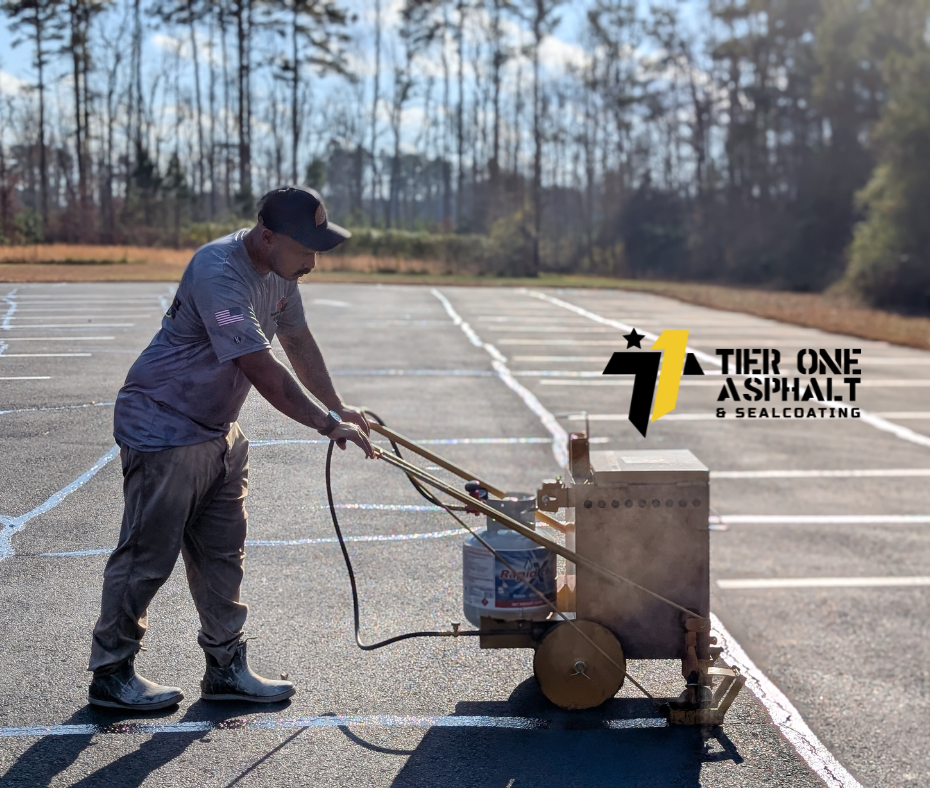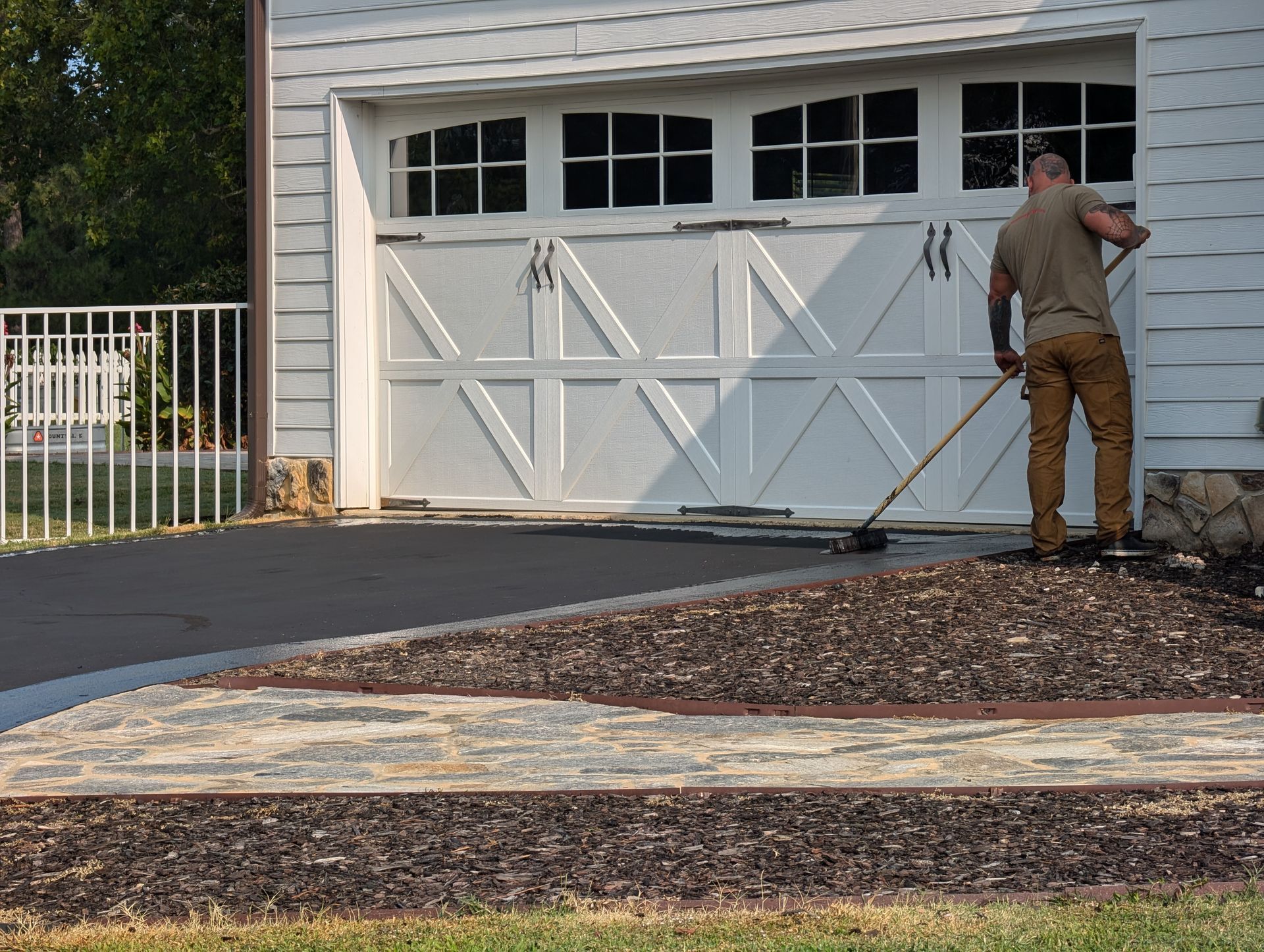Asphalt Repair vs. Replacement: Making the Right Choice in North Carolina’s Climate

Driveways, parking lots, and private roads are the first impression of a home or business. Smooth, well-maintained asphalt adds curb appeal and safety, while cracked, uneven surfaces can create hazards and drag down property value. When damage appears, property owners across North Carolina face one key question: Should I repair my asphalt or replace it entirely?
At Tier One Asphalt, we’ve helped homeowners, HOAs, and businesses across the state make this decision. It’s not always a one-size-fits-all answer—repairs can save money and extend pavement life, but replacement offers a fresh start with long-term durability. If you’ve been searching asphalt repair near me or asphalt driveway repair near me, you’re likely weighing which path is right for you.
This article will guide you through the decision process in detail. We’ll cover how North Carolina’s climate impacts asphalt, what signs suggest repair or replacement, how costs compare, and which option gives you the best return on investment.
North Carolina’s Climate: Why It Matters for Asphalt
Asphalt isn’t just a black surface—it’s a flexible pavement system designed to expand and contract with weather. In North Carolina, conditions can be particularly demanding:
Hot Summers and Sun Exposure
· Average summer highs reach the 80s and 90s.
· UV rays break down the binder in asphalt, making it brittle.
· Oxidation fades the surface from deep black to pale gray, signaling deterioration.
Heavy Rain and Storms
· The state averages 40–55 inches of rainfall annually, depending on region.
· Water infiltration through cracks weakens the foundation.
· Flooding or poor drainage accelerates pothole formation.
Freeze-Thaw Cycles in Winter
· Western NC and Piedmont areas experience winter lows below freezing.
· Water trapped in cracks expands when frozen, widening fissures.
· Repeated freeze-thaw cycles cause major base instability.
Traffic and Load Stress
· Residential driveways bear cars, trucks, and delivery vans.
· Commercial lots handle constant traffic, including heavy vehicles.
· Weakened asphalt under pressure breaks down more quickly.
Bottom line: In North Carolina’s climate, asphalt is under stress year-round. Understanding how these factors affect your pavement is the first step to knowing whether repair or replacement is best.
Asphalt Repair: Extending Life Without Full Replacement
Asphalt Repair is usually the first strategy for addressing surface-level damage. Think of it as preventive medicine for your pavement—it won’t turn back the clock entirely, but it can stop problems from getting worse.
1. Crack Sealing
· What it is: Filling narrow cracks with hot rubberized sealant.
· Best for: Linear cracks less than 1/2 inch wide.
· Why it works: Prevents water infiltration, the #1 cause of base failure.
· Lifespan: Adds 3–5 years of life when applied early.
A Durham homeowner notices fine cracks after a decade of use. With crack sealing, water is kept out, saving the base from premature failure.
2. Pothole Patching
· What it is: Cleaning out potholes, filling with asphalt mix, and compacting.
· Best for: Isolated damage spots caused by water intrusion or traffic stress.
· Why it works: Prevents accidents, vehicle damage, and further deterioration.
· Lifespan: Effective for 1–2 years depending on traffic load.
Example: A Greensboro business park fills potholes after winter storms. Customers avoid damage, and management buys time before larger repairs.
3. Sealcoating
· What it is: A protective liquid applied across the entire surface.
· Best for: Asphalt 2–5 years old or older surfaces showing oxidation.
· Why it works: Shields asphalt from UV rays, moisture, and oil stains.
· Lifespan: Typically reapplied every 2–3 years.
A Fayetteville homeowner invests in sealcoating every few years. The driveway stays dark and attractive while avoiding cracks.
4. Asphalt Overlay (Resurfacing)
· What it is: Adding a fresh layer of asphalt over the existing surface.
· Best for: Surfaces with moderate wear but a strong foundation.
· Why it works: Creates a “like new” appearance at a lower cost than full replacement.
· Lifespan: 8–10 years with maintenance.
A Wilmington HOA overlays their community roadways. Residents enjoy smooth driving without the disruption of full excavation.
When Asphalt Repair Makes Sense in NC
· Damage is under 25–30% of the surface.
· The base beneath the asphalt is still structurally sound.
· You need a quick, budget-friendly solution.
· You’re planning for eventual replacement but want to extend time.
Repairs are particularly effective for relatively new asphalt (under 12 years old) that’s showing early wear but isn’t failing.
Asphalt Replacement: Starting Fresh for Long-Term Performance
At some point, asphalt reaches the end of its useful life. That’s when replacement becomes the smarter choice. This process typically involves:
1. Removing the existing asphalt surface.
2. Repairing or replacing the base layer.
3. Installing brand-new asphalt pavement.
Signs You Need Replacement
· Widespread Alligator Cracking: A network of cracks signaling deep structural failure.
· Standing Water: Indicates poor grading or base erosion.
· Frequent Potholes: Recurring despite repeated patching.
· Surface Age: Asphalt older than 18–20 years.
· More Than 30% Damage: Repairs won’t restore overall strength.
Benefits of Replacement
· Longevity: 15–25 years of reliable service with proper care.
· Improved Drainage: Engineers can re-grade to prevent pooling water.
· Curb Appeal: Fresh, smooth surface boosts property value.
· Cost Efficiency Over Time: Eliminates frequent repair bills.
· Customization: Opportunity to widen, redesign, or improve traffic flow.
A Charlotte shopping center invests in full replacement after decades of patching. The new lot attracts tenants, improves safety, and reduces ongoing maintenance costs.
Repair vs. Replacement: Cost Analysis
Here’s a deeper look at costs in North Carolina:
· Crack Sealing: $1 – $2.50 per linear foot
· Pothole Repair: $150 – $500 each (depending on size)
· Sealcoating: $0.15 – $0.25 per square foot
· Overlaying: $3 – $7 per square foot
· Full Replacement: $8 – $15 per square foot
While repair looks attractive upfront, multiple small jobs can add up quickly. Replacement has a higher initial cost but may save thousands over two decades by reducing recurring maintenance.
Lifespan Comparison in NC’s Climate
· Repair: Adds 3–10 years depending on type.
· Replacement: Provides 15–25 years with maintenance.
Because of North Carolina’s heavy rainfall and heat, repairs may not last as long as in arid climates. For older, heavily used surfaces, replacement is often the more cost-effective choice.
Environmental Considerations
Both repair and replacement can be eco-conscious when handled properly:
· Recycled Asphalt Pavement (RAP): Old asphalt is crushed and reused.
· Sealcoating: Reduces long-term material use.
· Base Reconstruction: Modern methods improve water runoff, reducing erosion.
Sustainability isn’t just a trend—it’s built into today’s asphalt industry.
Real-Life Scenarios in North Carolina
· Residential Driveway in Raleigh: Hairline cracks at year 10 → repaired with crack seal + sealcoat. Cost-effective, no need for replacement.
· Church Parking Lot in Greensboro: 40% of surface failing at year 18 → replacement chosen to avoid ongoing liability from potholes.
· Community Roads in Wilmington: Coastal rain causes moderate damage → overlay applied for smoother drive and extended life.
Each case shows how property type, age, and climate dictate the right approach.
Quick Decision Guide: Repair vs. Replace
· Choose Repair If:
o Less than 25% of surface is damaged.
o Base layer is stable.
o Asphalt is under 12–15 years old.
o You need a budget-friendly short-term fix.
· Choose Replacement If:
o More than 30% of surface shows distress.
o Base issues are present.
o Asphalt is 18–20+ years old.
o You want long-term savings and property value boost.
Conclusion: Contact the Experts
North Carolina’s climate makes asphalt care a serious investment decision. Repairs can be an affordable way to extend life and maintain curb appeal, while replacement offers a fresh start for decades of reliable performance.
If your pavement is showing signs of wear, don’t wait until small cracks turn into costly failures. For anyone searching for asphalt repair near me or asphalt driveway repair near me, the best step forward is to contact Tier One Asphalt today. Our team will provide a professional evaluation and guide you toward the best solution for your property and budget.
FAQs
How often should I sealcoat my driveway in North Carolina?
Every 2–3 years is recommended to protect against UV damage, rain, and oxidation.
Will patching a pothole stop it from coming back?
It can provide temporary relief, but if the base is compromised, the pothole may return. Long-term fix may require deeper repair or replacement.
How do I know if water damage is affecting my asphalt base?
Signs include standing water, depressions, and cracks spreading rapidly. A professional inspection confirms base health.
Is asphalt replacement disruptive?
Replacement takes longer than repairs—typically 3–7 days depending on size—but the long-term benefit outweighs the inconvenience.
What’s the average lifespan of asphalt in NC compared to other states?
In NC, asphalt averages 15–20 years. In dry climates like Arizona, it may last 25+ years. Moisture and freeze-thaw cycles shorten lifespan here.
You might also like


